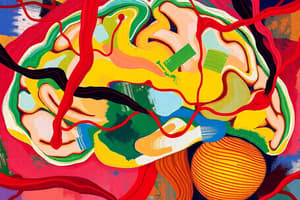Podcast
Questions and Answers
What is the most common cause of Ischemic stroke?
What is the most common cause of Ischemic stroke?
- Nausea and vomiting
- Rupture of blood vessel in or near the brain
- Thrombus or embolus blocking blood flow to the brain (correct)
- Sudden severe headache
What is a common symptom of Ischemic stroke?
What is a common symptom of Ischemic stroke?
- Loss of strength or sensation on one side of the body (correct)
- Blurred vision
- Sudden severe headache
- Nausea
What process is happening to prevent Ischemic stroke?
What process is happening to prevent Ischemic stroke?
- Neurological inhibition
- Hemostatic process (correct)
- Increased blood flow
- Reduced oxygen supply
When does Ischemic stroke mostly occur?
When does Ischemic stroke mostly occur?
What is a common symptom of Hemorrhagic stroke?
What is a common symptom of Hemorrhagic stroke?
What is a risk factor for stroke?
What is a risk factor for stroke?
What should you ask the individual to do to recognize if they are having a stroke?
What should you ask the individual to do to recognize if they are having a stroke?
What is the most common type of stroke?
What is the most common type of stroke?
What is the cause of Hemorrhagic stroke?
What is the cause of Hemorrhagic stroke?
What is a common sign of Ischemic stroke?
What is a common sign of Ischemic stroke?
What is a risk factor for stroke related to lifestyle?
What is a risk factor for stroke related to lifestyle?
What is a common symptom of both types of stroke?
What is a common symptom of both types of stroke?
Which drug is an oral direct thrombin inhibitor?
Which drug is an oral direct thrombin inhibitor?
What is the major side effect of thrombolytic agents?
What is the major side effect of thrombolytic agents?
Which drug should never be used during pregnancy due to its teratogenic effects?
Which drug should never be used during pregnancy due to its teratogenic effects?
What is the mechanism of action of aspirin?
What is the mechanism of action of aspirin?
Which drug is rapidly absorbed after oral administration with little individual patient variation?
Which drug is rapidly absorbed after oral administration with little individual patient variation?
What is the standard by which the anticoagulant activity of warfarin therapy is monitored?
What is the standard by which the anticoagulant activity of warfarin therapy is monitored?
Which drug is ATIII-dependent and accelerates the rate of the neutralization of certain activated coagulation factors by antithrombin?
Which drug is ATIII-dependent and accelerates the rate of the neutralization of certain activated coagulation factors by antithrombin?
Which drug inhibits ADP-mediated platelet aggregation?
Which drug inhibits ADP-mediated platelet aggregation?
Which drug is an oral anticoagulant and is metabolized by the CYP450 system to inactive components?
Which drug is an oral anticoagulant and is metabolized by the CYP450 system to inactive components?
Which drug should not be used in severe renal dysfunction (creatinine clearance less than 15 mL/min)?
Which drug should not be used in severe renal dysfunction (creatinine clearance less than 15 mL/min)?
Which drug is administered intravenously as an initial bolus to achieve immediate anticoagulation?
Which drug is administered intravenously as an initial bolus to achieve immediate anticoagulation?
Which drug is the prodrug of the active moiety dabigatran and is an oral direct thrombin inhibitor?
Which drug is the prodrug of the active moiety dabigatran and is an oral direct thrombin inhibitor?
Flashcards are hidden until you start studying



